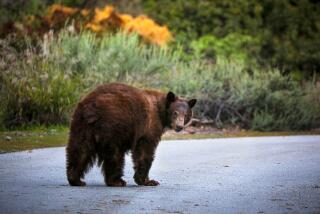Buds of a feather
The best-known duck hunt since Porky Pig chased Daffy, the recent trip by Vice President Dick Cheney and Supreme Court Justice Antonin Scalia has ruffled more feathers than Foster Farms. Some legal observers, TV and radio commentators and editorials in most of the nation’s largest newspapers argue that, since the Supreme Court will be taking up a case with Cheney at its center — whether he has the right to withhold details of White House meetings with energy officials that helped shape the administration’s energy policies — it was wrong for Scalia to share Louisiana marsh mud with his friend the Veep. Last week, the Sierra Club filed a rare motion for Scalia to recuse himself from the case, contending the trip was proof of conflict of interest. But Cheney and Scalia have insisted that the trip was harmless fun that would have no effect on judicial impartiality.
That runs counter to a growing body of evidence showing that shared experiences in the wild produce an intimate social bond that leaves people fondly disposed toward their companions. In fact, there are few things this side of boiling oil more persuasive than an adventure in the wilderness. Shared experiences in the wild create a powerful dynamic that promotes trust, camaraderie and empathy, many experts say.
Whether it’s a fishing trip or a whitewater paddling run, a romp in the woods loosens stiff upper lips and smooths the path to friendship and agreement. This knack has made the outdoors a favorite getting-to-know-you tool for presidents, business honchos and Washington lobbyists with spare fishing trips to Bimini. The Old Boy Network has always had a backcountry channel.
The Cheney-Scalia outing put the two at the intersection of a physiological and psychological process with the potential to join them at the wader. People behave differently outdoors. Comfort zones expand and bonds can grow even among the most wooden government officials and bean counters. In the natural environment, “people slow down; their sensory awareness widens,” explains Judith Holloway, a clinical psychologist in Los Angeles who takes doctoral students on trips into the wilderness. “Their ability to give themselves over, to trust people, increases.”
The environment conspires in a variety of subtle ways to increase our receptivity to others. Studies show the sound of water in the wild has a calming effect, while scenes of beauty can change mood and calm jangled nerves. “When we’re among congestion and traffic, we tend to withdraw,” says Marc Shoen, clinical professor of medicine at UCLA. “You go into the wild, and you get this space and openness. You don’t feel you need to protect yourself as much.”
It’s a world apart from the normal force field of defense mechanisms that keeps a tight lid on personal disclosures. Most people protect themselves behind the mask of the job title, which is merely a show face, something psychologists call the “persona,” a name taken from masks worn by actors in ancient times. But most people are bad actors. We want to get offstage and be who we are, the individual, not the collective face, to live within an authentic place. Shared experiences in the outdoors have a way of letting that happen naturally.
The wilderness is common ground, egalitarian turf devoid of the markers of station and competition. “It’s probably the only place human beings have left where we’re all the same,” says Ellin L. Bloch, a professor and director of the PhD program in clinical psychology at Alliant International University in Los Angeles. “That brings us to our most basic level of who we are as human beings. We’re not in the fancy buildings, there are no hierarchies, we’re just with the trees and birds.”
And, of course, with our soon-to-be buds, because all that commonality leads to greater feelings of trust and a willingness to disclose more of our real selves. Building similarity is the key to developing relationships. “Two guys in the woods, through that interaction, are increasing the basis of similarity between them,” says Margaret A. Neal, a professor of organization and dispute resolution at Stanford University.
A couple of days in a duck blind can provide enough similarity to leave the parties suspecting they might have been separated at birth. There’s the confederacy of whispered strategies, the shared drama of creeping in the crisp bite of dawn, the teamwork of stalking prey, induction into the tribe of rubber wear. The kick of guns against shoulders, the falling birds add an even deeper layer of bonding. “They’re focused on a common goal, ‘our’ target, which does pull out the archetypal hunter within,” says Pam Brill, a Bedford, N.H.-based psychologist and author of “The Winner’s Way.”
But even in less dramatic surroundings, the outdoors fosters a special intimacy with its ability to set the right mood. There’s time to chew the fat free from distraction. And that time is spent at play, a prime ingredient in the process that evokes carefree days and invites mutual participation. The relaxed mood sets the stage to put even the wary in a relationship today.
Steve Chaconas, a former radio talk personality in Washington who operates the National Bass Guide Service, provides all those conditions on half-day largemouth bass fishing outings in the D.C. area. Customers looking to pick up a personal history with someone, from mortgage bankers in search of Realtors to contractors out to swing government deals, get a very close hearing on the water.
“Our minimal trip is four hours,” says Chaconas. “No matter how much business is discussed, you’re going to get it over with in a short period of time. So the guys talk, ‘Oh, I didn’t know you had kids.’ They start bringing up places they lived, and inevitably they go back to times when they were fishing and enjoying the outdoors.”
Men become boys, women girls in the wilds, which makes for less judgment and more connection. Dick Alderson, business development manager for EMC Corp., a McLean, Va.-based maker of computer storage devices and software, was able to win a multimillion-dollar government contract in an afternoon of bass fishing on Chaconas’ boat from a client that had already installed his competitor’s system. “Taking a client fishing is just a much more relaxed environment,” he says. “It’s two guys standing on a boat for half a day. You’re never going to get more than about 10 feet from each other. You can have fun, tell stories, but you can talk some business, and nobody’s going to interrupt you. I was able to get enough time to explain our value proposition and position ourselves so that they’re using our technology, not the competition’s.”
That’s four hours of the outdoors at work. Spend a few days in the wilds engaged in an adrenaline-pumping activity — crossing swollen rivers, flinching as ducks explode out of the reeds — and, the critics argue, impartiality becomes about as viable as dichondra on Neptune. Cheney seems to be aware of this. According to an article in the New Yorker, when he was chief executive of Halliburton, Cheney reportedly clinched the $7.7-billion acquisition of the company’s chief competitor, Dresser Industries, on a quail hunting trip. At this rate, a pheasant outing with Ryan Seacrest could put the vice president in the finals of “American Idol.”
Adrenaline only enhances the relationship potential. Perceived or real stress — set off by the unknown of the wilds, risk-taking or fear — speeds up the intimacy process by breaking down defense perimeters and self-contained cocoons. There’s suddenly a need for someone else. You have to work together to get down the river or to keep from getting lost. “That creates a great bond with people,” says UCLA’s Schoen. It’s not the adrenaline itself that’s doing it, he adds, but what the adrenaline makes you do — step outside the bunker. That experience “starts creating warm, fuzzy feelings when you succeed. Then, if you’re around these other people, they, in essence, become conditioned as part of that feeling.”
This bonding ritual is so dependable that a host of consulting firms, adventure outfitters and survival schools have cloned it through hair-raising in the wild for everyone from spouses who’ve lost that loving feeling to corporations trying to create teamwork. One of the oldest wilderness training schools, the Boulder Outdoor Survival School (BOSS), sent 45 hotel general managers on a cross-country navigation in the Rockies, in search of clues and camaraderie across difficult terrain. At 9,000 feet in September, a freak snowstorm unloaded, adding a new test. It was just what the relationship doctor ordered. “They had to share clothing and body warmth,” recalls Josh Bernstein, CEO of BOSS. “You have to have some sort of stress for the team to bond. When people are pushed out of their comfort zones, true growth and learning can take place.”
This makes the ropes course, an increasingly popular adventure bonding tool, the Harvard of the outdoors. For real higher education, it’s hard to beat teetering like a cliff diver on a 40-foot treetop in a stiff breeze while hooked to a belay wire — and then jumping. Ropes courses offer an immediate hit of transformative terror, packing about 37 golf games’ worth of gladhanding into a few minutes of focused blood-brother vulnerability. One session on the ropes turned a difficult executive into something approaching human. “I have photos of him with his eyes like saucers,” says Hellen Davis, an ex-parachute instructor and president of Philadelphia-based Indaba Inc., who takes clients out on a course that involves navigating through obstacles while 60 feet in the air. “We strapped him in, and all of a sudden he was vulnerable. He started cracking jokes. He was seen in a completely different light.”
This is what the outdoors experience has offered bigwigs from Teddy Roosevelt to Cheney — and littlewigs too: the opportunity to see others, and be seen, in a broader, cozier way. Which brings us back to south Louisiana marshes and the propriety of the vice president and a Supreme Court justice about to hear his hunting partner’s case hanging out in such a potent buddy arena. “There’s a real difference between a meeting over cocktails at the White House and a couple of days together in a duck blind,” says David Bookbinder, Washington legal director for the Sierra Club. “A hunt together is not a simple social encounter; it’s a deep bonding experience.”
Scalia’s hunting trip with Cheney was not his first with a party who had a case pending before the court. Two years ago, Scalia went on a pheasant hunting trip organized by a Kansas law school dean, within weeks of the Supreme Court taking up two cases that would be argued by the same dean.
The Sierra Club attempt to get Scalia to sit out the pending Cheney case over Bush administration energy policy records may not go far. While a judge can be forced by a higher court to recuse him- or herself, the Supreme Court is the highest authority, no one but Scalia himself can do the recusing.
For his part, Scalia declined to comment. He did say in a written response to The Times article that broke this story: “I do not think my impartiality could reasonably be questioned.”
The vice president’s office said Scalia’s statement speaks for them both.
Joe Robinson is the author of “Work to Live.”
More to Read
Sign up for Essential California
The most important California stories and recommendations in your inbox every morning.
You may occasionally receive promotional content from the Los Angeles Times.










